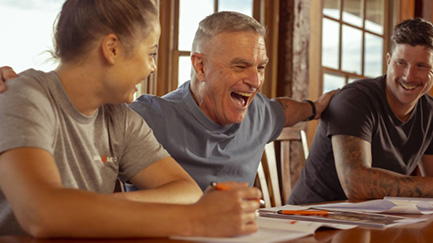
How to exercise your resilience muscle
While change is an inevitable part of life, it can sometimes stir up feelings of uncertainty. By understanding how we respond to change, we can strengthen our ability to cope and become more resilient.

During the month of April, we have been working with veterans and their families to improve their balance to reduce the risk of falls. From building up leg strength to practicing balance, this article explores several ways to reduce your risk of falls.
As we age, we naturally lose bone density, muscle mass and cognitive function, meaning our reaction times become slower. When an individual becomes less physically active, the decline becomes more rapid. This can lead to a decrease in balance, functional ability and independence and increase the likelihood of falls.
Having a fall can lead to several consequences, including:
Studies show most falls occur while some is at home or in aged care facilities, with 35% taking place on flat surfaces starting from a simple slip, trip or stumble. Smaller unrests can be corrected with a simple sway at the ankles or hips; however, larger stumbles require faster reaction and movement.
To reduce your risk of falls, try and include the following exercises into your daily routine:
Mobility exercises
Keep your joints moving freely and regularly, especially your ankles and hips.
Static balance
Work on your static balance in different foot positions (e.g., tandem, single leg stance) and test yourself by changing the surface (e.g., stand on foam) or by closing your eyes.
Dynamic balance
Try to take part in exercises that can help your dynamic balance and agility such as tandem walking, hopping or cone weaving quickly. Test your brain with additional challenges such as walking backwards, counting backwards in 7’s, saying A-Z of boy or girl names whilst completing the exercise.
Reaction time
Work on reaction time by stepping out in different directions quickly. You can use a metronome for pace or a friend to call out random directions. You can also practise this by throwing and catching a ball with a friend, making sure to change speeds and direction randomly.
Strength
Keep strength up so you can withstand forces with simple exercises such as calf raises, squats or sit to stands and push ups.
Thank you to all who got involved in No Falls Month, but remember, it does not have to stop here. If you are looking for more ways to reduce your risk of falls, reach out to the team at your local Family recovery Centre.
Written by Mates4Mates Exercise Physiologist, Nami Terada

While change is an inevitable part of life, it can sometimes stir up feelings of uncertainty. By understanding how we respond to change, we can strengthen our ability to cope and become more resilient.